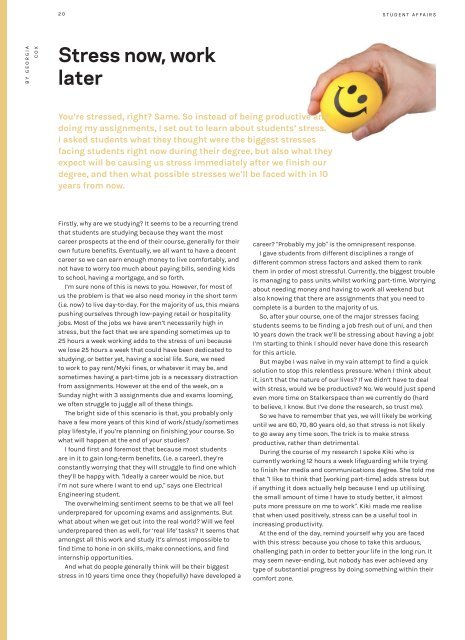You also want an ePaper? Increase the reach of your titles
YUMPU automatically turns print PDFs into web optimized ePapers that Google loves.
20<br />
STUDENT AFFAIRS<br />
BY GEoRGIA<br />
CoX<br />
Stress now, work<br />
later<br />
You’re stressed, right? Same. So instead of being productive and<br />
doing my assignments, I set out to learn about students’ stress.<br />
I asked students what they thought were the biggest stresses<br />
facing students right now during their degree, but also what they<br />
expect will be causing us stress immediately after we finish our<br />
degree, and then what possible stresses we’ll be faced with in 10<br />
years from now.<br />
Firstly, why are we studying? It seems to be a recurring trend<br />
that students are studying because they want the most<br />
career prospects at the end of their course, generally for their<br />
own future benefits. Eventually, we all want to have a decent<br />
career so we can earn enough money to live comfortably, and<br />
not have to worry too much about paying bills, sending kids<br />
to school, having a mortgage, and so forth.<br />
I’m sure none of this is news to you. However, for most of<br />
us the problem is that we also need money in the short term<br />
(i.e. now) to live day-to-day. For the majority of us, this means<br />
pushing ourselves through low-paying retail or hospitality<br />
jobs. Most of the jobs we have aren’t necessarily high in<br />
stress, but the fact that we are spending sometimes up to<br />
25 hours a week working adds to the stress of uni because<br />
we lose 25 hours a week that could have been dedicated to<br />
studying, or better yet, having a social life. Sure, we need<br />
to work to pay rent/Myki fines, or whatever it may be, and<br />
sometimes having a part-time job is a necessary distraction<br />
from assignments. However at the end of the week, on a<br />
Sunday night with 3 assignments due and exams looming,<br />
we often struggle to juggle all of these things.<br />
The bright side of this scenario is that, you probably only<br />
have a few more years of this kind of work/study/sometimes<br />
play lifestyle, if you’re planning on finishing your course. So<br />
what will happen at the end of your studies?<br />
I found first and foremost that because most students<br />
are in it to gain long-term benefits, (i.e. a career), they’re<br />
constantly worrying that they will struggle to find one which<br />
they’ll be happy with. "Ideally a career would be nice, but<br />
I’m not sure where I want to end up," says one Electrical<br />
Engineering student.<br />
The overwhelming sentiment seems to be that we all feel<br />
underprepared for upcoming exams and assignments. But<br />
what about when we get out into the real world? Will we feel<br />
underprepared then as well, for ‘real life’ tasks? It seems that<br />
amongst all this work and study it’s almost impossible to<br />
find time to hone in on skills, make connections, and find<br />
internship opportunities.<br />
And what do people generally think will be their biggest<br />
stress in 10 years time once they (hopefully) have developed a<br />
career? "Probably my job" is the omnipresent response.<br />
I gave students from different disciplines a range of<br />
different common stress factors and asked them to rank<br />
them in order of most stressful. Currently, the biggest trouble<br />
is managing to pass units whilst working part-time. Worrying<br />
about needing money and having to work all weekend but<br />
also knowing that there are assignments that you need to<br />
complete is a burden to the majority of us.<br />
So, after your course, one of the major stresses facing<br />
students seems to be finding a job fresh out of uni, and then<br />
10 years down the track we’ll be stressing about having a job!<br />
I’m starting to think I should never have done this research<br />
for this article.<br />
But maybe I was naïve in my vain attempt to find a quick<br />
solution to stop this relentless pressure. When I think about<br />
it, isn’t that the nature of our lives? If we didn’t have to deal<br />
with stress, would we be productive? No. We would just spend<br />
even more time on Stalkerspace than we currently do (hard<br />
to believe, I know. But I’ve done the research, so trust me).<br />
So we have to remember that yes, we will likely be working<br />
until we are 60, 70, 80 years old, so that stress is not likely<br />
to go away any time soon. The trick is to make stress<br />
productive, rather than detrimental.<br />
During the course of my research I spoke Kiki who is<br />
currently working 12 hours a week lifeguarding while trying<br />
to finish her media and communications degree. She told me<br />
that "I like to think that [working part-time] adds stress but<br />
if anything it does actually help because I end up utilising<br />
the small amount of time I have to study better, it almost<br />
puts more pressure on me to work". Kiki made me realise<br />
that when used positively, stress can be a useful tool in<br />
increasing productivity.<br />
At the end of the day, remind yourself why you are faced<br />
with this stress: because you chose to take this arduous,<br />
challenging path in order to better your life in the long run. It<br />
may seem never-ending, but nobody has ever achieved any<br />
type of substantial progress by doing something within their<br />
comfort zone.


















